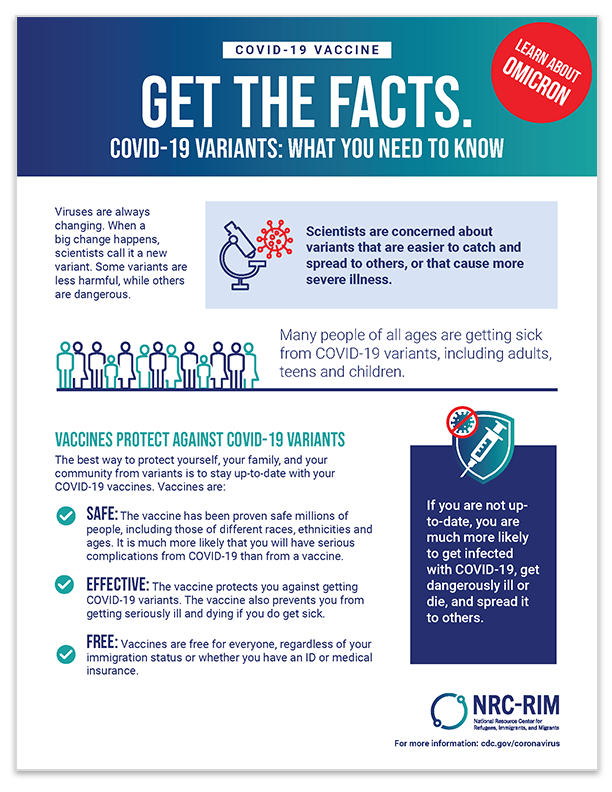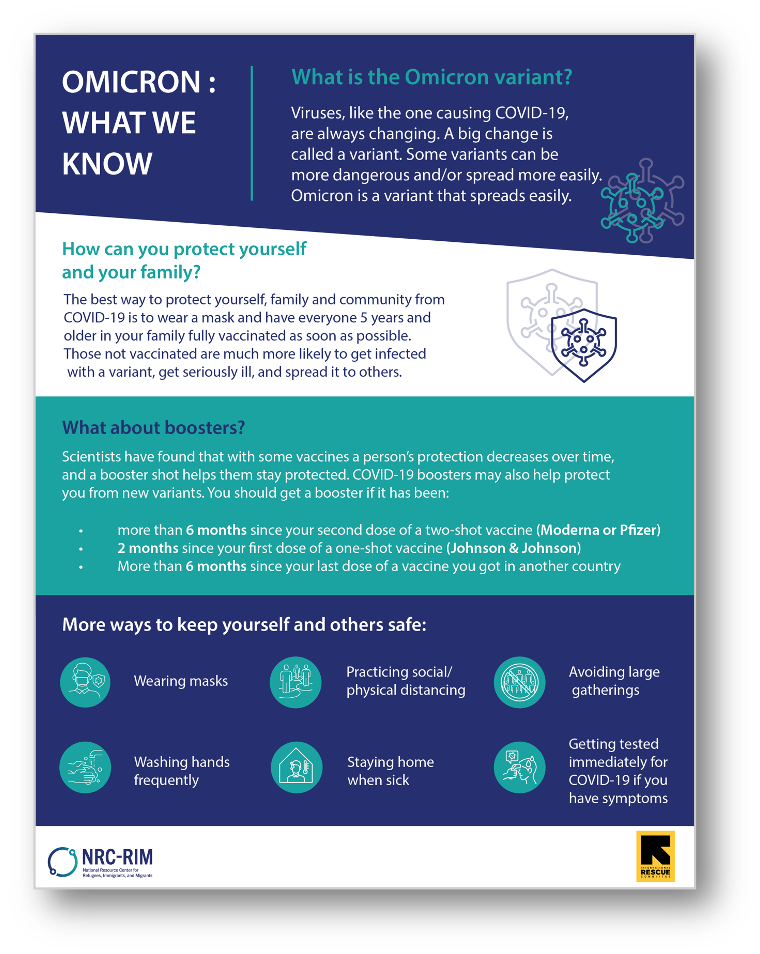
What is a variant?
Viruses are always changing to try to outsmart our bodies and to assure it can survive through spreading to new people. When a big change happens, scientists call it a new variant. Some variants disappear and never cause harm, while others can make a virus easier to spread, harder to treat, and/or more deadly. When variants occur, scientists and experts monitor them closely. Many variants of the COVID-19 virus have already been discovered and are being monitored. Certain variants are more successful and present a greater danger than others, like Delta and Omicron. These are called variants of concern.
Below are answers to commonly asked questions about variants of concern:
What is the Omicron variant?
Omicron is a variant of COVID-19 that was detected in November 2021. Omicron spreads more easily than other variants of COVID-19.
Generally, people get less sick with Omicron than other variants, but some people still get dangerously ill or die. Even if only a small percentage of people with an Omicron infection get dangerously ill, it spreads so easily that hospitals can get very full with sick people quickly (source).
The best way to protect yourself, your family, and your community from variants like Omicron is to stay up-to-date with your COVID-19 vaccines. If you are not up-to-date, you are much more likely to get infected with COVID-19, get dangerously ill or die, and spread it to others.
Staying up-to-date on COVID-19 vaccines means getting both doses of your two-shot vaccine and then getting a booster shot when you are eligible. Boosters are shots you get after you are fully vaccinated so that you can stay protected against COVID-19. Boosters may broaden your protection against new variants like Omicron.
What is the Delta variant?
Delta is a variant of COVID-19 that was discovered in December 2020. Since then, it has spread all over the world. . Scientists are concerned about Delta because it spreads more easily and may cause more severe illness.
The best way to protect yourself, your family, and your community from variants like Delta is to stay up-to-date with your COVID-19 vaccines. If you are not up-to-date, you are much more likely to get infected with COVID-19, get dangerously ill or die, and spread it to others.
Staying up-to-date on COVID-19 vaccines means getting both doses of your two-shot vaccine and then getting a booster shot when you are eligible. Boosters are shots you get after you are fully vaccinated so that you can stay protected against COVID-19. Boosters may broaden your protection against new variants like Omicron.
Are vaccines effective against variants of concern?
Yes. COVID-19 vaccines in the United States are effective against Delta, Omicron, and other variants that have been discovered. It is important to stay up-to-date with your COVID-19 vaccines for the greatest protection. This includes getting both doses of a two-shot vaccine, and then getting booster shot when you are eligible.
How do I protect myself, my family, and community from the Delta and Omicron variants?
The best way to protect yourself, your family, and your community from variants is to stay up-to-date with your COVID-19 vaccines. If you are not up-to-date, you are much more likely to get infected with COVID-19, get dangerously ill or die, and spread it to others.
Staying up-to-date on COVID-19 vaccines, including getting a booster when you are eligible, is important so that you have the most protection.
Getting our entire communities vaccinated is one way to prevent dangerous variants from developing in the first place. As more unvaccinated people are infected with the virus, there are more chances for variants to develop. By getting many people vaccinated, and ensuring they stay up-to-date, we are making it less likely for the virus to spread and change.
Wearing a mask, practicing social distancing, avoiding gatherings with many people, staying home when you are sick and washing your hands frequently are other ways to keep yourself and others safe.
I have heard that fewer people are getting COVID-19 now in the United States. Does this mean I do not need to get a COVID-19 vaccine?
No. As long as there are a significant number of people who are not up-to-date with their COVID-19 vaccines, even if the number of cases goes down for a while, it will always come back and surge again. This may happen at different times in different places, but it will continue to occur.
Staying up-to-date with your COVID-19 vaccines is the best way to protect yourself and your community against COVID-19 and its variants. Almost all COVID-19 related hospitalizations and deaths in the U.S. are among people who are not up-to-date.
Because the variants are so common and many communities no longer require protections like mask wearing and social distancing, the risk is much higher for those who are not up-to-date.
Can people get COVID-19 even after being fully vaccinated? If so, does this mean the vaccine does not work?
When people to get COVID-19 after they are vaccinated, scientists call it a “breakthrough infection.”
COVID-19 vaccines are effective at preventing serious illness, and death. Boosters offer even more protection. However, since vaccines are not 100% effective at preventing infection, some people who are fully vaccinated will still get COVID-19.
For more information, please see CDC’s “What You Should Know About the Possibility of COVID-19 Illness After Vaccination.”
Which COVID-19 vaccine would you recommend?
All COVID-19 vaccines available in the United States are safe, effective, and decrease your risk for severe illness, hospitalization, and death from COVID-19. Therefore, when considering being vaccinated, the vaccine recommended is the one that is available to you. The CDC recommends Pfizer or Moderna or Novavax vaccines over Johnson & Johnson (J&J) when possible, because of concerns about certain rare side effects in people who received J&J.
It is important to stay up-to-date on your COVID-19 vaccines, including getting a booster when you are eligible, to make sure you have as much protection as possible.
What is the BA.2 (Stealth) variant?
BA.2 is the name that scientists gave to a subvariant of Omicron. Subvariants are a type of COVID-19 that is very similar to a variant that already exists; BA.2 is a type of Omicron.
COVID-19 tests are accurate at detecting whether you have BA.2 or other variants and subvariants of COVID-19. Some people call BA.2 a "stealth variant" because it looks similar to other variants on COVID-19 tests.
BA.2 is more contagious than other subvariants of Omicron and much more contagious than other variants of COVID-19. It is very important to stay up-to-date on your COVID-19 vaccines to protect yourself against BA.2. That means getting both doses of a two-shot vaccine and any boosters you are eligible for.
You can get even more protection for yourself and your community by wearing a mask, practicing social distancing, and staying home when you feel sick.

